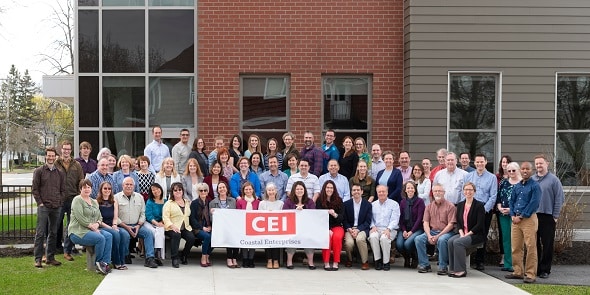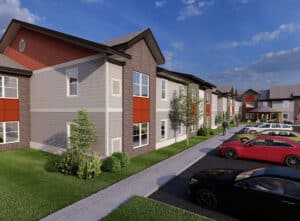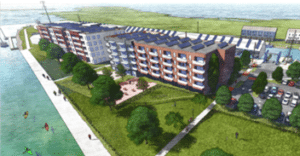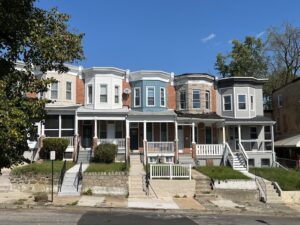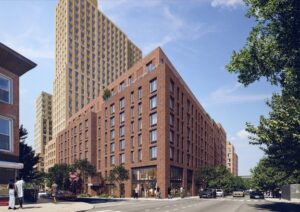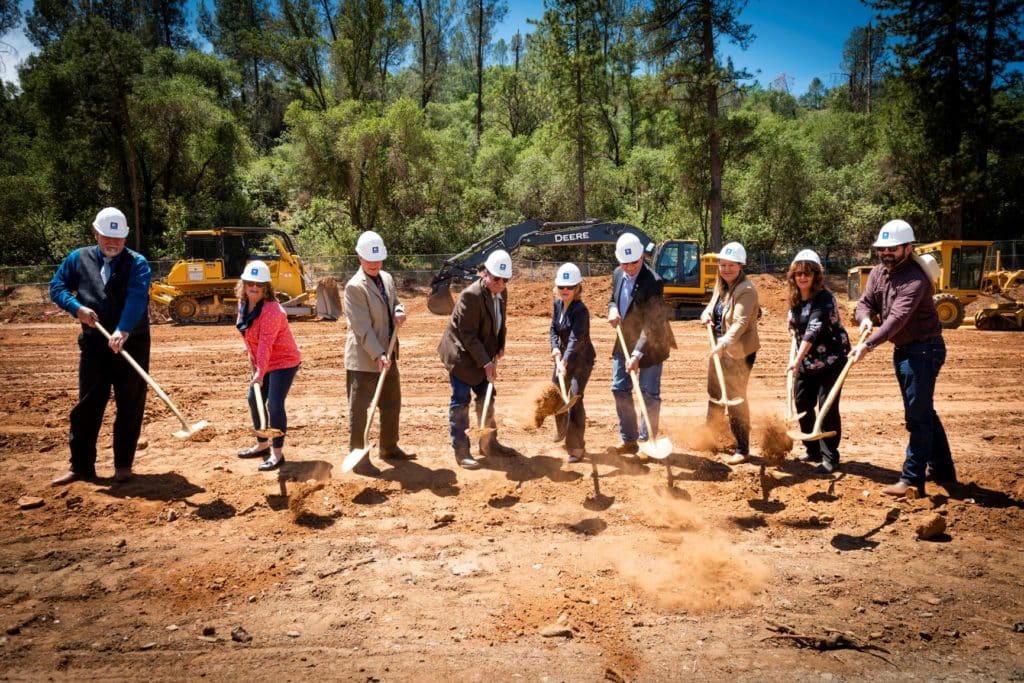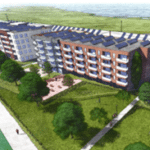
NewHeight Redfern is under contract to purchase and redevelop Mercy Hospital, currently a functioning hospital and a major institutional anchor in Portland, Maine. The mixed-use redevelopment of 250,000 square feet of buildings on 3.5 acres will feature apartments, condominiums, a commercial/office space (including nonprofit space), and a self-storage facility. Total development costs are estimated at $105.5 million.
NeighborWorks Capital will provide a 50% participation in a $1.4 million acquisition loan from Coastal Enterprises, Inc. (CEI), a Maine-based CDFI, to help fund acquisition and predevelopment costs. The loan is subordinate to an $11.4 million senior loan from Machias Savings Bank and will be repaid from the proceeds of 10 different land, condominium, and building sales to various phases of the projects.
“Being able to partner with another organization like NeighborWorks Capital is a gigantic leverage and multiplier for the projects we’re able to do,” said John Egan, Chief Investment Officer at CEI. “Having a partnership with a match of mission, scope, and mutual understanding makes it go very smoothly.”
This is NeighborWorks Capital’s third loan participation transaction with CEI, which typically participates out loans with CDFIs and with local banks.
“We are proud to partner with CEI to participate in this transformative public-private partnership in Portland,” said NeighborWorks Capital Senior Loan Officer Emily Dorfman.
NewHeight Redfern is a newly formed investor group that won the 2018 RFP and is under contract to purchase the State Street Campus. Today it’s a functioning hospital. After 75 years in the current location, Mercy Hospital has begun consolidating on a new modern campus a few miles away.
Because the property is historic, and CEI invests in historic tax credits and affordable homes, they submitted proposals to work with the group. When NewHeight Redfern came to CEI with their plan, Egan said their first call was to NeighborWorks Capital. It was an easy process, as NeighborWorks understands the challenges of complex deals and getting the loan structures in place.
“We would not be able to do these projects if we didn’t have NeighborWorks Capital as our partner. This partnership allows us to be more flexible and responsive in our home territory of Maine. We get to do more than we would otherwise,” Egan said.
Project Details
NewHeight Redfern is proposing an ambitious mixed-use redevelopment consisting of both historic rehabilitation and new construction components. The planned redevelopment totals $108.5 million of development costs and 415,480 square feet, which will consist of the following:
- Approximately 100 affordable apartments
- Approximately 100 market rate apartments, most of which will qualify as workforce housing based on rents affordable at 80-120% AMI
- 70 for-sale market rate condominiums and townhouses
- 102,560 square feet of commercial use
NewHeight Redfern’s two for-profit development companies have a track record of success in Portland in market-rate apartments and condominiums. They also brought in Community Housing of Maine (CHOM) and the Portland Housing Authority as nonprofit partners to contribute to the development and subsidy needs of the end development’s affordable components.
High Demand, Low Vacancy Market
As the economic nucleus of Maine, with an expanding economy, combined with a dense footprint and low volume of construction of rental housing and office space, has led to Portland’s historically low and declining vacancy rates in recent years, as well as a shortage of affordable homes. Q2 2019 saw a 2.4% vacancy, with average monthly rents at $1,331.
Housing demand in Portland has been “white-hot,” Egan said. “We can’t build units fast enough. Anything permitted or for-sale has sold out, even before financing is lined up. We’ll see 10-15 percent down on a sketch from a developer.”
The affordable and workforce apartments plus Mercy Hospital’s central location on a main artery will be main selling points.
Hospital to Move, Clinic Remain
Mercy Hospital will remain in place after the borrower’s purchase of the property through a two-year, triple-net lease, with options to extend between 3-12 additional months. This allows time for the hospital to transition to its new facilities, while providing cash flow to the developer. The neighborhood wanted the site to retain a walk-in clinic in the new development, which it will.
The hospital hopes to be moved to their new campus by early 2022. Meanwhile, there will be concurrent permitting, design work, and community input for the redevelopment. Then it will take two to three years to complete the combination of new construction and floor-by-floor renovations.
COVID19 Response
As the coronavirus pandemic reached Maine, CEI has complied with the state’s stay-at-home mandate by working remotely. They’d developed a telecommute policy last year to encourage and enhance flexibility for their staff, and it’s helped them transition smoothly during this time of uncertainty. However, their community groups and gathering places are shut down, which has severely curtailed monthly income.
CEI is working with its loan portfolio customers by applying immediate payment relief: three months of interest-only payments, or one month of payment relief. They expect to go longer than three months to let businesses recover, Egan said. They are looking for opportunities to secure low-price or free access to capital for their portfolio, to offer flexibility to borrowers as well.
They also are working with their business advisors across Maine to navigate the new SBA programs and applications as they come in. Their portfolio has about 450 loans, and they’ve made modifications to about 100 loan accounts in 10 working days, Egan said. “We are trying to stay ahead of the wave as things change daily. Sometimes even by the hour.”
Finally, its farmer and farm distributor customers are particularly challenged, as their customers are restaurants that are closed under the mandate. Tech-savvy farmers are pivoting to social media to encourage residents to buy local food products.
About CEI
Coastal Enterprises, Inc. (CEI) was founded in 1977 to help create income, employment and ownership opportunities. CEI today integrates financing, business and industry expertise, and policy solutions to help grow good jobs, environmentally sustainable enterprises, and shared prosperity in Maine and other rural regions. CEI has completed 45 historic rehabilitations since 2011, ranging in size from a retail store with two apartments above it, to schools, churches, and its $59 million investment in repurposing the Lincoln Textile Mill.

